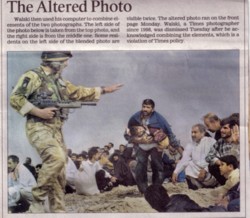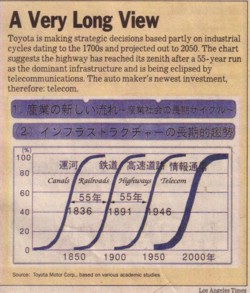Hist
2c, L 5: Economic ("industrial") Revolution
by H. Marcuse, Apr. 15, 2003 (4/16: images will be added soon)
Main question, again (still): What made "the West" different
from "the East"?
- Equiano discussion; review
- The Great Divergence
- Convergence of factors
Papers due today
Olaudah Equiano, 1747/55-1797
- Child of the Enlightenment?
- Executor of the Enlightenment?
- Gravedigger of the Enlightenment?

 Fact
vs. fiction
Fact
vs. fiction
LA Times, 3/31 & 4/2/03 (digital montage of 2 Iraq photos, on front page
3/31, exposed as manipulated on 4/2/03)
discuss the relative importance of factual correctness vs. impact (same as
with Equiano)
Previous lectures' questions [image
of EIEIO model]
- What causes historical change?
- What role do ideas play in historical change?
- What made "the West" different from "the East"?
Slavery/antislavery movement
Revolution of ideas (sci. rev. & Enlightenment)
Revolutions of politics, society, & culture
Concepts: revolution, economy
- Revolution: "complete overthrow; marked change"
- text p. 439 (Amer. rev.): "? an abrupt change in
the economic and social structures."
- Economics: management (of household)
- production, distribution and use of goods and services
- Economic revolution:
Types of Economic Org.
- Traditional:
- God-given
- like parents, like children (agriculture)
- Command:
- slaves; dictatorial "plans"
- Market
- anarchic pursuit of self interest
Confluence of factors
- Demographic "revolution"
- Fuel crisis (energy)
- Surplus money
- Organizational innovations (finances)
- New mindset
- Technological innovations
- Infrastructure (transportation)
1. Demographic "revolution"
- Surplus population: due to drop in death rate
- 1720-1750 in England:
- 30 years of top harvests: surplus food
- no need to slaughter animals
- more fertilizer - more intensive agriculture
possibility of breeding animals
- Innovations in agriculture
- crop rotation, enclosure, water meadows
2. Fuel crisis (energy)
- More people -> wood shortage
- Switch to coal (coke)
- smelting of iron
- need to mine more
- need better tools (iron ones, machines)
3. Surplus money
- good harvests
- "capital" from slave production/trade
- more intensive agriculture
4. Organizational innovations
- Dutch banking system:
- credit and loans (remember Columbus)
- corporations
- paper money
- Cottage industry vs. factory system
- workers dispersed vs. under one roof
- classes: capitalists supply goods
- pace set by machines
5. New mindset
- "Dissenters" (new religions): Quakers, Congregationalists,
Unitarians, Baptists, Presbyterians
- prosperity=sign of God's grace (not a sin)
- living for the here and now
- education in practical things
- work ethic
- do not consume all
6. Technological innovations
- better iron implements
- steam engine
 7.
Infrastructure
7.
Infrastructure
- roads, canals, railroads
- communication
Announcements
- Quiz on Thursday: chaps. 40, 42
- Sign up for office hour visits Tues. & Wed.
Music / DVD
- Music: British Industrial Folk songs:
- Four Loom Weaver (wages
low after 1815),
- Collier Laddie (1700s,
sung by wives of coal miners): spirit of pride and independence
- Four Pence a Day (lead miners in 1850, pits
closed)
- DVD "Working Lives" (disc 2, mins. 3-12) [computer
was too slow, so we only saw ca. 2 mins.]
- illustrated summary of confluence of causes
Inventors [did not get
to this]
- Abraham Darby (1678-1717)
- used coke to smelt copper, then iron (1708)
- factory at Coalbrookdale (near low-sulphur coal)
- 1777-79 one of world's first cast-iron bridges
- 1805: works produced 1st locomotive w/
high-pressure boiler
- 1712 Newcomen Engine invented
- by 1758: 100, used to pump water
- Josiah Wedgewood (1730-1795)
Prepared for web by H. Marcuse, 4/16/03; images added 4/20/03
back to top; UCSB Hist 2c homepage

 Fact
vs. fiction
Fact
vs. fiction